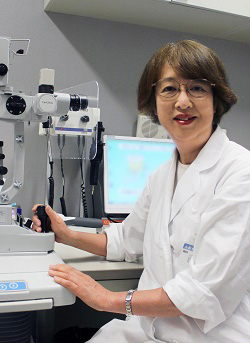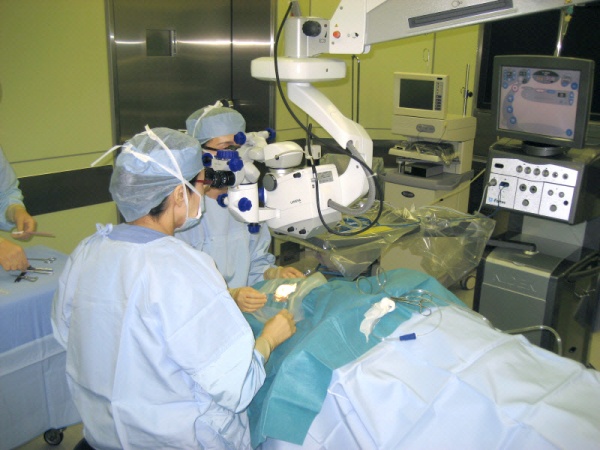Mari Tsujimura
About the department
Our department of ophthalmology provides a wide range of medical care in the general ophthalmologic field including refractive error, such as myopia and astigmatism, anterior eye diseases such as dry eye, keratoconus, and keratitis, highly prevalent cataract and glaucoma, and fundus diseases such as macular degeneration, diabetic retinopathy, and retinal vein occlusion. We can perform in-hospital surgery for cataract and glaucoma and in-hospital procedures, such as steroid pulse therapy. Furthermore, we perform intravitreal injections and laser therapies (including PDT) for retinal diseases as part of our outpatient practice. Among them, we focus on the medical care for dry eye and macular disease and prescription of HCL for keratoconus, all of which are given by specialists.
Common diseases treated
- Refractive error: myopia, hyperopia, astigmatism, and keratoconus, etc.
- Extraocular diseases: entropion of the eyelid, ptosis, and lacrimation, etc.
- Anterior eye diseases: dry eye, keratitis, conjunctivitis, and keratoconus, etc.
- Lens diseases: cataract and secondary cataract, etc.
- Uveitis: iridocyclitis, sarcoidosis, and Harada disease, etc.
- Glaucoma: primary glaucoma, secondary glaucoma, and ocular hypertension, etc.
- Retinal diseases: age-related macular degeneration, diabetic retinopathy, and retinal vein occlusion, etc.
- Pediatric ophthalmology: strabismus and amblyopia, etc.
- Neuroophthalmological/orbital diseases: optic neuritis and thyroid ophthalmopathy, etc.
Director of the department

Specialty/qualification
- Diploma of ophthalmology of the Japanese Ophthalmological Society
Characteristics of dental care
We provide the general ophthalmologic practice every day. If you have a personal ophthalmologist, bring a referral form and prescription record for receiving our practice smoothly. Especially when you want to have a second opinion, be sure to bring the referral form of your previous doctor, related test/examination data, and prescription record.
- Outpatient clinic for dry eye: This clinic is open in the morning of Tuesday, Thursday, and Friday every week for new patients. A test to determine the type of dry eye will be performed, and based on the test result, the treatment for the type (medication, punctal plugs, and punctal cautery, etc.) will be given. The outpatient clinic for dry eye will cooperate with the outpatient clinic for dry mouth, as required.
- Outpatient clinic for keratoconus/contact lens: This outpatient clinic is open in the morning of the second Thursday every month to provide specialized care including the adjustment/processing of HCL by the CL technician from SUN CONTACT LENS Co., Ltd. Since the clinic offers a variety of test lenses including special lenses, consult us if you have any difficulties wearing HCL, such as poor fit or lens that easily falls out of the eye. You can try many types of SCL, including bifocal and circle lenses, mainly from reliable domestic manufacturers.
- Outpatient clinic for macula: This clinic is open in the morning of Tuesday and Friday every week to provide medical care by an external specialist. This clinic makes diagnosis using state-of-the-art diagnostic imaging systems and provides treatments including the intravitreal injection of an anti-VEGF agent, laser therapy, and photodynamic therapy.
- Cataract surgery (lens reconstruction) is the most popular type of ophthalmic surgery, and we have extensive experience of the surgery. In response to the patients' request to be all prepared for surgery, we conduct cataract surgery under inpatient management in principle. The hospitalization period will be generally 4 days and 3 nights for surgery of one eye: you will be hospitalized in the morning on Monday, receive surgery in the afternoon on the same day, and be discharged in the morning on Thursday. However, since this depends on the condition of the eye disease, consult with your doctor at the outpatient clinic (you may choose from 1 to 4 nights).
- Medical care for glaucoma: As glaucoma is called "ultra chronic disease," lifelong management is important. We provide diagnostic imaging and periodic visual field test with attention to structural and/or functional changes to carefully determine whether pharmacotherapy and/or invasive treatment (surgery) is indicated or not. We actively cooperate with ophthalmologists at local medical institutions to allow patients to continue hospital visit smoothly: for example, patients may receive routine ocular pressure measurement and get a prescription for eye-drops at the personal ophthalmologist’s office and receive special examinations, such as Goldmann perimetry, at our hospital.

Ophthalmic surgery